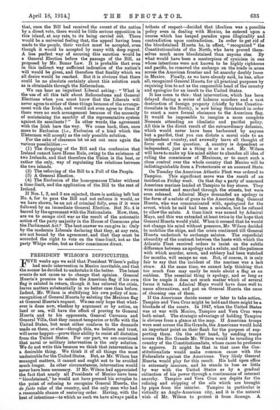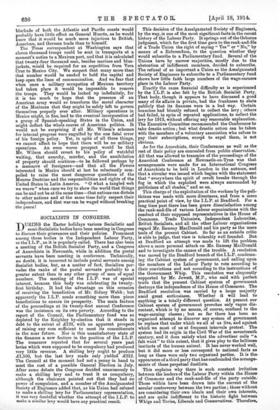PRESIDENT WILSON'S DIFFICULTIES.
FIVE weeks ago we said that President Wilson's policy had made intervention in Mexico inevitable, and that the sooner he decided to undertake it the better. The latest events do not cause us to change that opinion. General Huerta's promise to salute the American flag if his own flag is saluted in return, though it has relieved the crisis, leaves matters substantially in no better case than before. Indeed, Mr. Wilson is stultifying his own policy of non- recognition of General Huerta by saluting the Mexican flag at General Huerta's request. We can only hope that what- ever is done now, whether by argument or by action, on land or sea, will have the effect of proving to General Huerta and to his opponents, General Carranza, and General Villa, that they cannot temporize or trifle with the United States, but must either conform to the demands made on them, or else—though this, we believe and trust, will never happen—prove their ability to resist all dictation from the United States. For our part, we are convinced that naval or military intervention is the only solution. We do not write this because we think that intervention is a desirable thing. We think it of all things the most undesirable for the United States. But, as Mr. Wilson has managed matters, it cannot and ought not to be avoided much longer. In other circumstances, intervention would never have been necessary. If Mr. Wilson had appreciated the fact that nearly all Presidents of Mexico have been " bloodstained," he would not have pressed his scruples to the point of refusing to recognize General Huerta, the de facto ruler of the country, and the only man who had a reasonable chance of restoring order. Having, with the lost of intentions=to which as, such we have always paid a tribute of respect—decided that idealism was a possible policy even in dealing with Mexico, he entered upon a course which has heaped paradox upon illogicality and contradiction upon contradiction. In order to get rid of the bloodstained Huerta he, in effect, " recognized " the Constitutionalists of the North, who have proved them- selves much more bloodstained than anyone else. By what would have been a masterpiece of cynicism in one whose intentions were not known to be highly righteous and pacific, he removed the embargo on the trade in arms across the American frontier and let anarchy doubly loose in Mexico. Finally, as we have already said, he has, after all, recognized General Huerta for all practical purposes by requiring him to act as the responsible head of the country and apologize for an insult to the United States.
It has come to this that intervention, which has been delayed during a series of hideous murders and a vast destruction of foreign property (chiefly by the Constitu- tionalists in the North), is now being threatened in order to exact a mere formal obeisance to the American flag. It would be impossible to imagine a more complete Nemesis attending an idealistic and pacifist policy. All this is the direct result of the extraordinary delusion, which would never have been harboured by anyone but a pacifist, that you can dictate a moral code to an independent country, and avowedly leave all thought of force out of the question. A country is dependent or independent, just as a thing is or is not. Mr. Wilson will have to make up his mind either to abandon all idea of ruling the consciences of Mexicans, or to exert such a close control over the whole country that Mexico will be indistinguishable from a Protectorate or an annexed State.
On Tuesday the American Atlantic Fleet was ordered to Tampico. This significant move was the result of an incident on Friday week. On that day a party of unarmed American marines landed at Tampico to buy stores. They were arrested and marched through the streets, but were soon released. Admiral Mayo demanded an apology in the form of a salute of guns to the American flag. General Huerta, who was communicated with, apologized for the arrest, which he said had been a mistake, but he refused to allow the salute. A time-limit was named by Admiral Mayo, and this was extended at least twice in the hope that General Huerta would yield. When it seemed that be would not change his mind without pressure, Mr. Wilson decided to mobilize the ships, and the crisis continued till General Huerta undertook to exchange salutes. The superficial absurdity of the contrast between the haste with which the Atlantic Fleet received orders to insist on the subtle difference between an apology and a salute, and the patience with which murder, arson, and robbery had been watched for months, will escape no one. But, of course, it is only fair to say that the incident of the marines was a last straw. At the same time, we cannot help thinking that too much fuss may easily be made about a flag as an emblem. The essential thing is apology, and so long as this be ample it does not much matter which of several forms it takes. Admiral Mayo would have done well to name alternatives, and put on General Huerta the onus of choosing one of them.
If the Americans decide sooner or later to take action, Tampico and Vera Cruz might be held and there might be a blockade of the coasts. In 1847, when the United States was at war with Mexico, Tampico and Vera Cruz were both seized. The strategic advantage of holding Tampico
is obvious from a glance at the map. If American troops
were sent across the Rio Grande, the Americans would hold an important point on their flank for the purpose of sup- porting them. On the other hand, by sending troops across the Rio Grande Mr. Wilson would be invading the country of the Constitutionalists, whose cause he professes to approve. It might be that in that case the Con- stitutionalists would make common cause with the Federalists against the Americans. Very likely General Huerta would play for this result. His hold upon office
is extremely insecure, and he stands to lose as little by war with the United States as by a gradual
extinction of his power through a continuance of internal anarchy. Tampico and Vera Cruz are depots for the refining and shipping of the oils which are brought
by pipes from the interior. Tampico in particular, is virtually an Anglo-American city, and it is the natural wish of Mr. Wilson to protect it from damage. A. blockade of both the Atlantic and Pacific coasts' would probably have little effect on General Huerta, as he would know that it would be much more injurious to British, American, and German trade than to himself.
The Times correspondent at Washington says that eleven thousand troops could be sent in transports at a moment's notice to a Mexican port, and that it is calculated that twenty-four thousand men, besides marines and blue- jackets, would be required for an expedition from Vera Cruz to Mexico City. We 'suspect that many more than that number would be needed to bold the capital and keep open the lines of communication. And we fear that when once a military occupation of Mexican territory had taken place it would be impossible to remove the troops. They would be locked up indefinitely, for it is too much to hope that the presence of an American army would so transform the moral character of the Mexicans that they might be safely left to govern themselves properly ever after. Military operations in Mexico might, in fine, lead to the eventual incorporation of a group of Spanish-speaking States in the Union, and might deflect the whole course of American politics. It would not be surprising if all Mr. Wilson's schemes for internal progress were engulfed by the one fatal error of his foreign policy. Yet, in spite of all these things, we cannot affect to hope that there will be no military operations. An even worse prospect would be that Mr. Wilson should revert to his policy of watchful' waiting, that anarchy, murder, and the annihilation of property should continue—to be followed perhaps by a massacre of foreigners—and that all the Powers interested in Mexico should at last be reluctantly com- pelled to raise the most dangerous questions of the Monroe Doctrine and the responsibilities and rights of the United States in Latin America. " 0 what a tangled web we weave" when once we try to show the world that things can be and not be at the same time—that nations can dictate to other nations and at the same time fully respect their independence, and that war can be waged without breaking the peace!











































 Previous page
Previous page